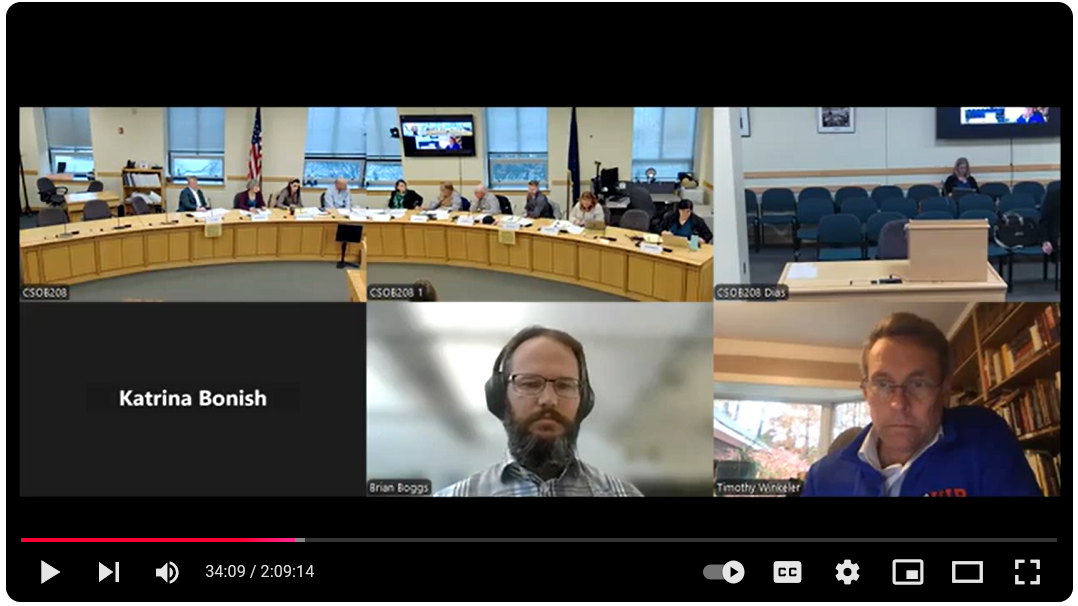Control and transmittal of vehicle diagnostic data to independent repair shops in Maine could soon be managed by an independent licensing board, a new state agency, or through a “no-board model,” participants pitched during the latest meeting of the Maine Automotive Right to Repair Working Group, held Oct. 30.
Section 2 of the August-enacted law requires the right to repair working group, overseen by the state attorney general’s office, to recommend legislation to establish an “entity” to ensure cyber-secure access to vehicle-generated data for car owners and independent repair shops for maintenance, diagnostic and repair purposes.
Per the law, legislative recommendations due in February must address the future entity’s ability to monitor vehicle manufacturer compliance with standards adopted by that entity, to craft and oversee policies for evolving use and availability of vehicle-generated data, and to draft rules to enforce standards for data ownership and transmission.
It isn’t contemplated that the entity itself will host vehicle data, but it could have some rulemaking authority, Maine Chief Deputy Attorney General Christopher Taub said during the meeting.
For example, the entity could issue a rule stating that no car manufacturer is required to release vehicle data unless the receiver has proper credentials, he said.
“We don't envision the entity being the gatekeeper of the information,” Taub said.
The entity could, however, operate similarly to a state medical licensing board, which in Maine operates as a quasi-governmental agency with authority to issue regulations, investigate patient complaints, take corrective action and refer the matter to the state attorney general’s office for further action if necessary, Taub said.
“All of these licensing boards are regulatory,” he added. “They have rulemaking authority; they have enforcement authority; they have investigatory authority; they can serve subpoenas in a lot of cases.”
Christina Moylan, chief of the Consumer Protection Division in the Office of the Maine Attorney General, said she envisioned repairers or consumers would bring data-access complaints to the attorney general’s office in cases where a car ostensibly cannot be repaired for various reasons. The entity could assist, according to Moylan, in discerning whether the failure to transfer data to repairers or consumers stems from a legitimate technical issue or something more minor.
Outside of a licensing board, a second option for the entity is to take the form of a “more traditional” state agency to be housed within an overarching department like the Department of Public Safety, Department of Administrative and Financial Services, or the Department of the Secretary of State, Taub noted.
Tesla Director of Service Engineering Brian Boggs pitched the third model.
A “no-board model” would save taxpayers the most money, Boggs said, proposing the deletion of the law’s Section 2 altogether.
Eliminating this language would remove the requirement to establish an entity to ensure cyber-secure access to vehicle data for car owners and independent repairers, as well as craft and enforce policies toward that end.
Moylan said an independent entity incorporating expertise from auto manufacturers, aftermarket parts manufacturers and distributors, independent repairers and others would give a “much more balanced and fair approach” to discerning the validity of complaints.
“The concept of the independent entity with combined expertise from all sides of the issue is going to give us a much more balanced and fair approach to figuring out whether there is an enforcement issue,” she said.
Later, Moylan said she didn’t “want to suggest” the Maine attorney general’s office would deny the working group if it agreed the best way to implement Maine’s forthcoming right-to-repair standards is to split from the independent entity concept and take another tact.
“So long as the enforcer has … some balanced information that we could use, one mechanism could be to actually beef up some of the substantive provisions of the law, and that might help give us some guardrails and parameters that would help us,” she said. “We would need that balanced expertise. Maybe there's another way to do it.”
Meeting participants also discussed the possibility of legislation during the next legislature starting in January that would prevent the independent entity’s formation.
“The legislature is free to do whatever they want with this” law, Taub said. “They could repeal it completely; they could get rid of the independent entity part of it. This is a law like any other law in the state, so the legislature is free to do what it wants. This past session, there was a bill that, among other things, would have repealed the independent entity provision. That did not prevail.”














Brian Bradley